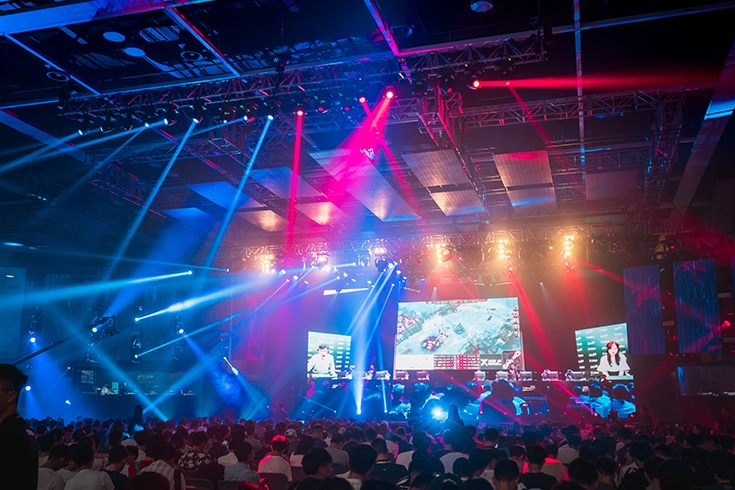Does the Prize Money for eSports Fall Under the Japanese Gambling Offense? How to Provide Prizes While Complying with the Law

Recently, e-sports has rapidly come into the spotlight.
In Japan, the attention towards it is gradually increasing, and the domestic e-sports market in 2020 was 6.68 billion yen, 109% compared to the previous year. It is predicted to grow to over 18 billion yen by 2024. (Reference: “Famitsu”)
Considering the ripple effects on related industries, e-sports tournaments are no longer just for a niche group of enthusiasts, but are beginning to hold significant societal importance. Therefore, tournament organizers must give full consideration to related laws and regulations.
In this article, we will explain in detail the relationship and concerns between e-sports tournaments that distribute prize money and the “Japanese Gambling Crime” and “Japanese Crime of Opening a Gambling Place for Profit”.
The Relationship Between eSports Tournament Participants and Gambling Offenses

“Gambling offenses” are crimes that eSports tournament participants may potentially be charged with.
Japanese Penal Code Article 185 (Gambling)
Anyone who gambles shall be punished by a fine of up to 500,000 yen or a pecuniary penalty. However, this does not apply when betting on items for temporary entertainment.
“Gambling” is defined as an act of disputing the gain or loss of property or property rights based on the outcome of chance.
The requirements for a gambling offense are as follows:
- The outcome is determined by chance
- Disputing the gain or loss of property or property rights
Additionally, there is an exception clause in the proviso that states, “This does not apply when betting on items for temporary entertainment.”
We will explain the contents of each requirement below.
Is the outcome of eSports tournaments determined by “chance”?
The outcome of eSports is greatly influenced by the skill of the players.
However, even if the outcome is greatly influenced by the participants’ abilities, if there is any element of chance and the outcome cannot be freely controlled, it can be said that there is an element of chance. Therefore, it can be said that eSports tournaments, like shogi, mahjong, and go, are “determined by chance.”
Do eSports tournaments “dispute the gain or loss of property or property rights”?
There are various mechanisms for eSports tournaments, and whether the participants’ actions constitute “gambling” depends on how the tournament is held.
If the actions are judged to be “gambling,” the participants are likely to be charged with a gambling offense. Let’s look at some patterns.
No participation fee and no property is bet
In this case, the participants do not lose their “property or property rights” even if they lose the match. Therefore, this method of holding does not constitute “gambling.”
The collected participation fee is not used as the source of the prize money
This is a system where even if a participation fee is collected from the participants, it is not used as the source of the prize money, and the sponsor directly pays the prize money.
In this case, the loser’s money does not go to the winner. Therefore, it is considered that there is a low possibility of constituting “gambling.”
The collected participation fee is used as the source of the prize money
In this case, essentially, the prize money is bet using the participation fee as the source, so the winner gains profit and the loser loses profit. Therefore, there is a possibility that it constitutes “gambling.”
Does the prize money of eSports tournaments fall under “items for temporary entertainment”?
Article 185 of the Penal Code stipulates in the proviso that “this does not apply when betting on items for temporary entertainment,” denying the illegality of the act in certain cases.
“Items for temporary entertainment” refers to items with low economic value that can be consumed on the spot for mere entertainment, and does not inherently include money.
Specifically, it refers to small amounts of food and drink, etc.
The prize money for eSports tournaments varies from tournament to tournament, but it is often a large amount of money, and it is clear that it does not fall under “items for temporary entertainment.”
Therefore, if it meets the requirements of a gambling offense, it can be said that there is a low possibility of denying the illegality of the act.
Esports Tournament Organizers and the Crime of Profiting from Gambling

From here, we will explain the “crime of profiting from gambling” that tournament organizers must be aware of.
Article 186 of the Japanese Penal Code (Habitual Gambling and Profiting from Gambling)
1. A person who habitually gambles shall be punished by imprisonment for up to 3 years.
2. A person who opens a gambling place or combines gamblers to make a profit shall be punished by imprisonment for at least 3 months and up to 5 years.
The “crime of profiting from gambling” is a crime that is established by the organizer who opened the gambling place.
The crime of profiting from gambling is established when any of the following acts are committed:
①Opened a gambling place to make a profit (crime of profiting from opening a gambling place)
②Combined gamblers to make a profit (crime of profiting from combining gamblers)
A gambling place refers to a place where gambling is allowed.
However, it is not necessary for it to be a place dedicated to gambling. Be aware that you may be held criminally liable if you organize gambling and make a profit in cyberspace using the Internet, etc.
Also, the crime of profiting from gambling is established when a gambling place is opened, so even if no actual gambling is taking place, there is a high possibility that a crime can be established.
Furthermore, it is required that the organizer has a purpose of obtaining financial benefits from the opening of the gambling place. At this time, whether or not actual profits are being made is not an issue in the establishment of the crime.
How to Legally Host an eSports Tournament

So, how should you go about hosting an eSports tournament legally?
Do Not Collect Participation Fees
In this case, even if participants lose the game, they do not lose any of their ‘property or financial benefits’, so it does not constitute ‘gambling’. This can be said to be the safest method.
Distinguish and Manage the Source of Participation Fees and Prize Money
However, hosting an eSports tournament requires a certain amount of expenses, so it is conceivable to collect participation fees.
In that case, if the sources of the participation fees and the prize money are clearly distinguished and allocated to the operating costs of the tournament other than the prize money, it is considered that the possibility of being judged as ‘gambling’ is low.
Prize Money is Paid Directly by Sponsors
If the prize money is paid directly by a third party such as a sponsor, even if participation fees are collected, it is clear that they are not used as the source of the prize money, so it is considered that the possibility of being judged as ‘gambling’ is low.
What is the JeSU Certified Pro License System?

The Relationship Between eSports Tournaments and the Japanese Prize Indication Law
So far, we have looked at the relationship between eSports tournaments and gambling offenses under the Japanese Penal Code. However, various other laws also apply to eSports tournaments. In this section, we will explain the relationship with the “Japanese Prize Indication Law”.
The Japanese Prize Indication Law (Act against Unjustifiable Premiums and Misleading Representations) is designed to protect consumer interests. It sets a limit on the provision of excessive premiums to ensure that consumers can choose appropriate products and services.
The prize money for eSports tournaments may fall under these “premiums”, and thus may be subject to the Japanese Prize Indication Law.
Which Prize Money Tournaments are Regulated by the Japanese Prize Indication Law?
This is determined by the “organizers of the prize money tournament” and the “sales and billing methods of the competition title”.
eSports tournaments are thought to be distinguished by whether they are organized by the game company selling the game software or by a third party. The former is subject to the Japanese Prize Indication Law.
If the competition title is sold for a fee or if the “amount charged affects the strength of the user”, it will be subject to the regulations of the Japanese Prize Indication Law.
Conversely, in the case of “free titles where the amount charged does not affect the strength of the user”, it is believed that they will not be regulated even if the game company provides prize money.
In summary, those subject to the regulations of the Japanese Prize Indication Law are “tournaments organized by game companies using paid sales titles or titles where the amount charged affects the strength of the user”.
The Concept of “Work Compensation”
Amid concerns about the development of eSports in Japan due to the relationship between the Japanese Prize Indication Law and high prize money, the concept of “work compensation” emerged to dispel these concerns.
This is the idea that if prize money is provided as “compensation for work” for “appearing in a tournament”, it will not be subject to the regulations of the Japanese Prize Indication Law.
However, at that time in Japan, there was no consensus on “under what circumstances the prize money in eSports tournaments would be recognized as ‘work compensation'”, and there were no criteria for judgment.
Therefore, when holding a prize money tournament, each company had to make individual judgments and bear the risk of holding the tournament, which continued for a while.
The Birth of the JeSU Certified Pro License System
Therefore, the Japan eSports Union (JeSU) launched the “JeSU Pro License System” as a unified standard to ensure the entertainment and competitiveness of eSports and to legally hold prize money tournaments.
eSports players, by holding a JeSU Certified Pro License, clearly become professional eSports players and acquire the right to participate in and receive prize money at JeSU Certified Official Tournaments.
By clearly stating through the pro license system that the player’s activities are work, it has become possible to realize “tournaments that can definitely award prize money to players”.
However, a JeSU pro license is not a mandatory requirement for high prize money. In actual tournaments, there have been cases where players without a JeSU pro license have won and received prize money.
Later, the Consumer Affairs Agency stated that in addition to “tournaments that limit the provision of prize money to pro license players”, if “prize money is provided according to the results of tournaments, etc., with limited participants in a certain way”, even participants without a pro license are recognized as providing “work compensation”, and therefore are not subject to the regulations of the Japanese Prize Indication Law.
Through such a process, the issue of the Japanese Prize Indication Law regarding high prize money has been resolved.
The number of prize money tournaments in Japan has been expanding, and as of 2022, it is not illegal in Japan to award high prize money in eSports, and many tournaments with prize money are being held.
Conclusion: Providing Legally Compliant Prizes in eSports
In this article, we have discussed the legal issues involved in distributing prizes at eSports tournaments.
When organizing an eSports tournament, various considerations are necessary, particularly in terms of how the event is conducted and the prize money involved.
Furthermore, there are various related laws and regulations applicable to eSports tournaments, including but not limited to the Penal Code and the Act against Unjustifiable Premiums and Misleading Representations (Japanese Act against Unjustifiable Premiums and Misleading Representations). Therefore, we recommend that tournament organizers do not make independent judgments on these issues, but consult with lawyers who have specialized knowledge and extensive experience in advance.
If you want to know more about the relationship between eSports tournaments and the Act against Unjustifiable Premiums and Misleading Representations (Japanese Act against Unjustifiable Premiums and Misleading Representations), please see the detailed description below in conjunction with this article.
Introduction to Our Firm’s Measures
Monolith Law Office is a legal office with high expertise in both IT, particularly the internet, and law.
In recent years, many e-sports tournaments sponsored by companies have been held. However, in Japan, the legal system is not yet fully established, and there are many points to be careful about when hosting such events.
Our firm provides solutions related to corporate legal affairs for startups and IT companies. Details are described in the article below.
Category: Internet





















